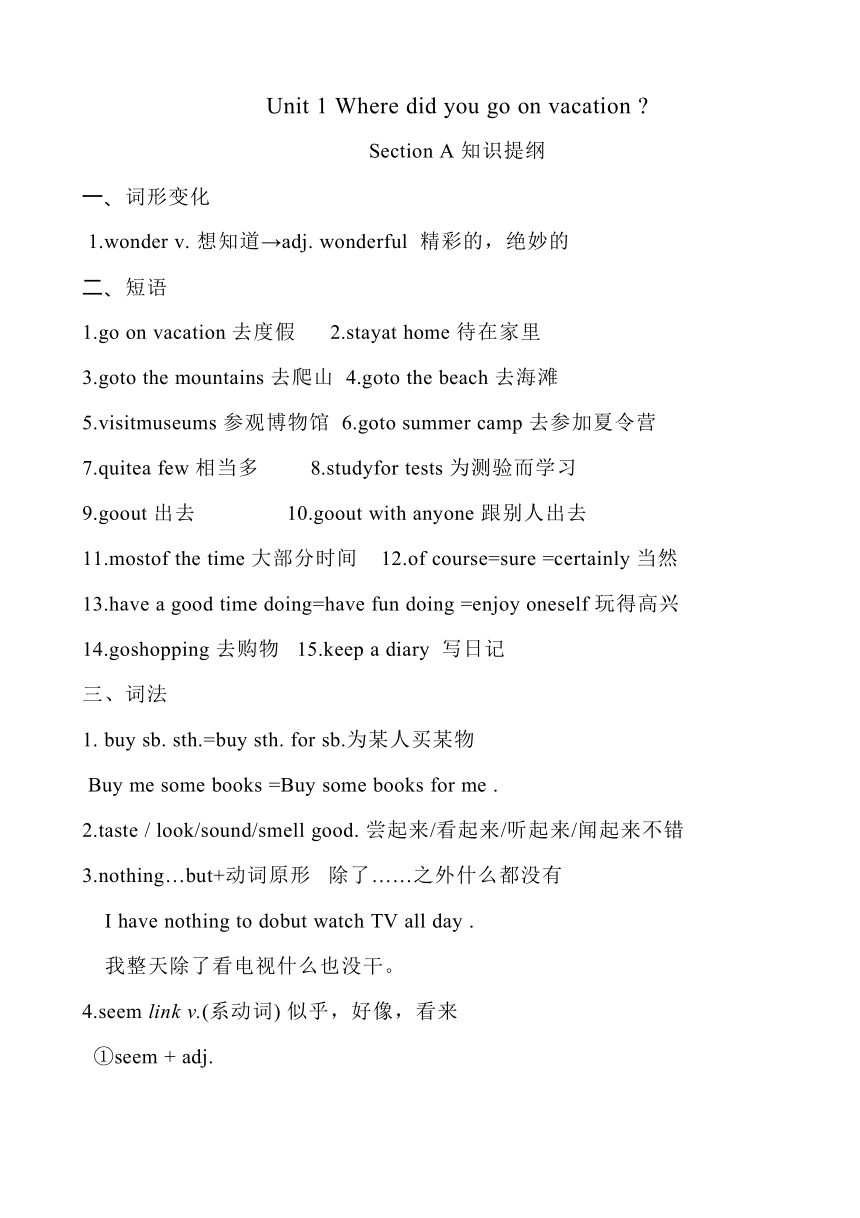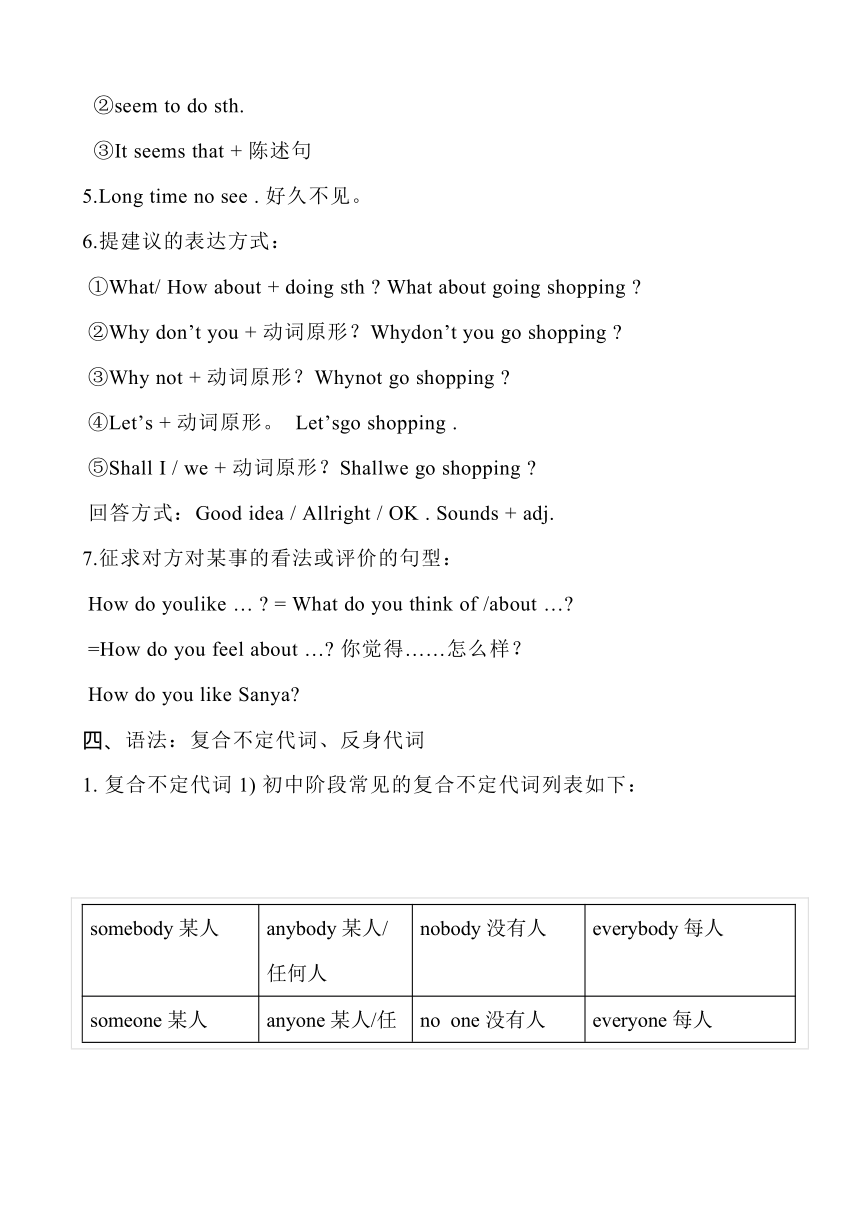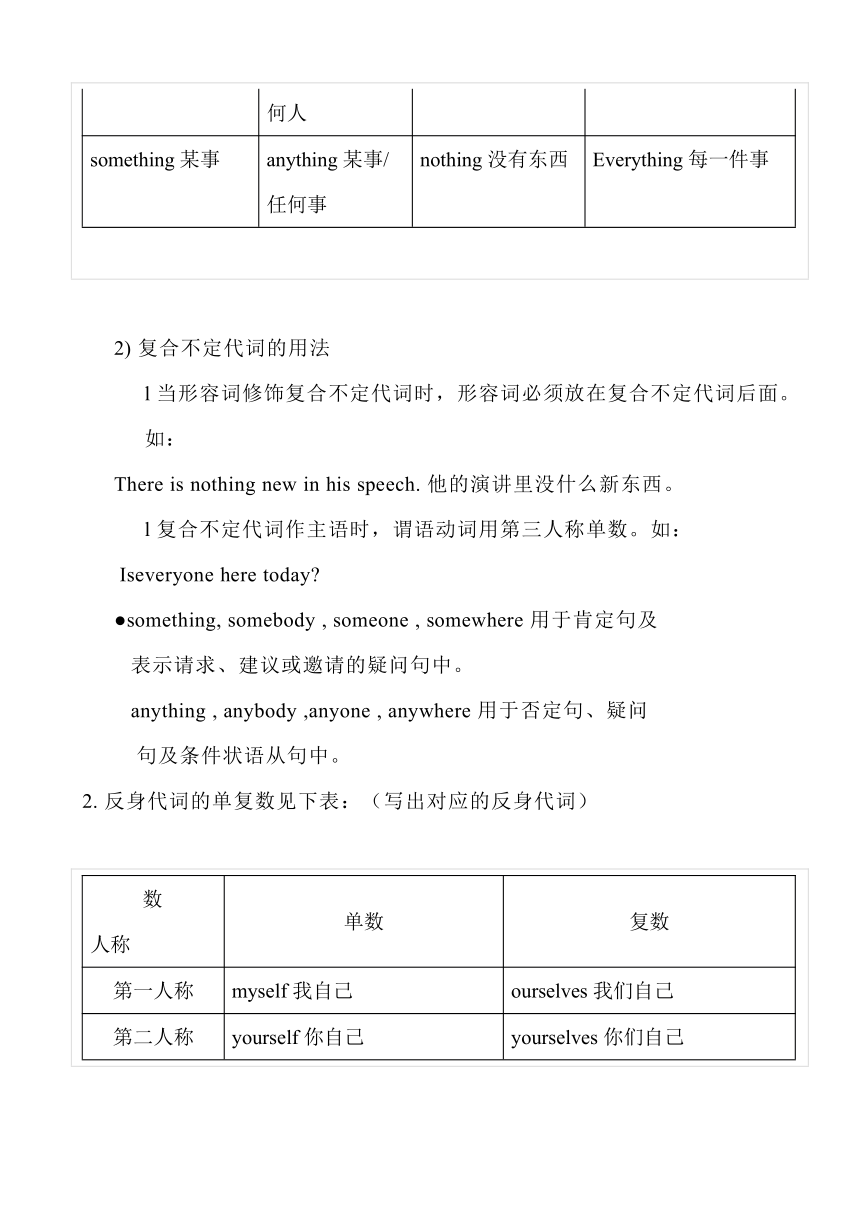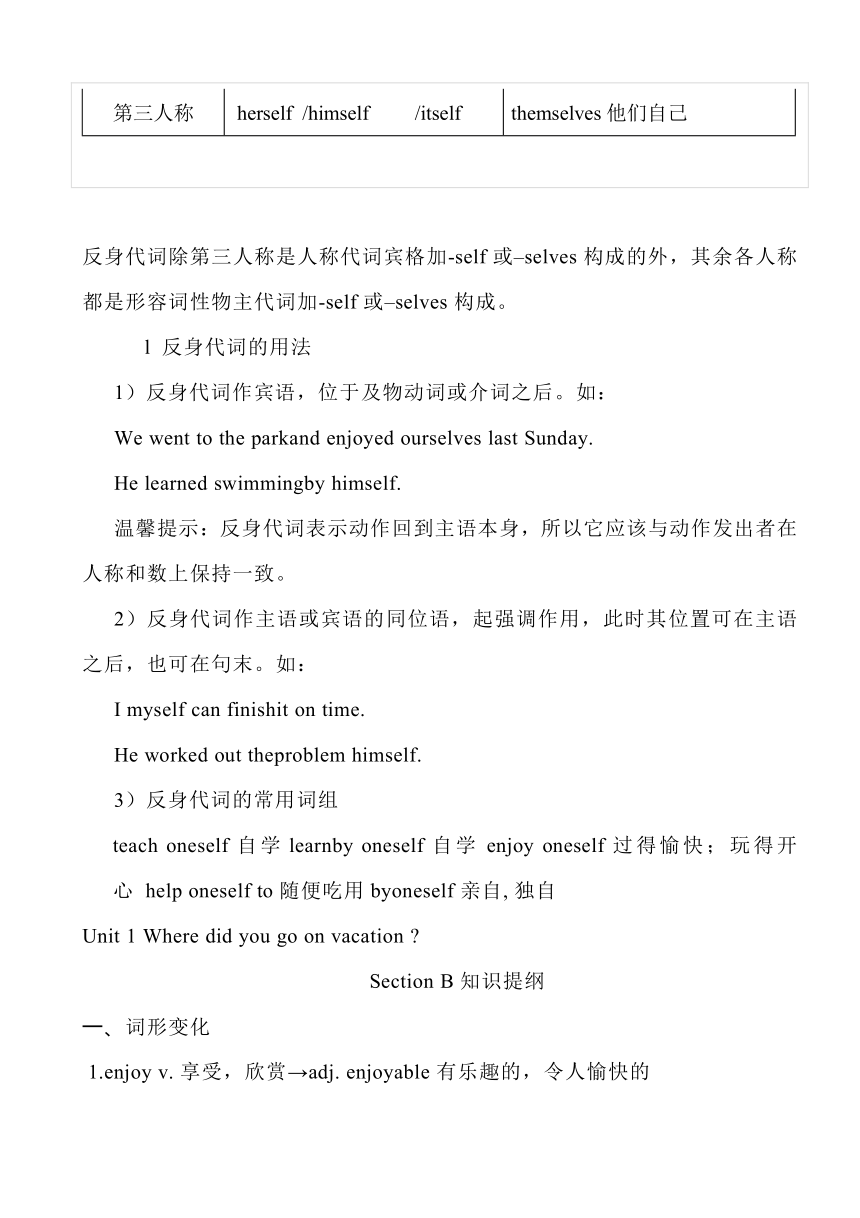八年级英语上册 Unit 1 Where did you go on vacation? 知识提纲
文档属性
| 名称 | 八年级英语上册 Unit 1 Where did you go on vacation? 知识提纲 |  | |
| 格式 | doc | ||
| 文件大小 | 124.5KB | ||
| 资源类型 | 教案 | ||
| 版本资源 | 人教新目标(Go for it)版 | ||
| 科目 | 英语 | ||
| 更新时间 | 2023-06-07 19:03:06 | ||
图片预览




文档简介
Unit 1 Where did you go on vacation
Section A 知识提纲
一、词形变化
1.wonder v. 想知道→adj. wonderful 精彩的,绝妙的
二、短语
1.go on vacation去度假 2.stayat home待在家里
3.goto the mountains去爬山 4.goto the beach去海滩
5.visitmuseums 参观博物馆 6.goto summer camp去参加夏令营
7.quitea few相当多 8.studyfor tests为测验而学习
9.goout出去 10.goout with anyone 跟别人出去
11.mostof the time大部分时间 12.of course=sure =certainly当然
13.have a good time doing=have fun doing =enjoy oneself玩得高兴
14.goshopping去购物 15.keep a diary 写日记
三、词法
1. buy sb. sth.=buy sth. for sb.为某人买某物
Buy me some books =Buy some books for me .
2.taste / look/sound/smell good. 尝起来/看起来/听起来/闻起来不错
3.nothing…but+动词原形 除了……之外什么都没有
I have nothing to dobut watch TV all day .
我整天除了看电视什么也没干。
4.seem link v.(系动词) 似乎,好像,看来
①seem + adj.
②seem to do sth.
③It seems that + 陈述句
5.Long time no see . 好久不见。
6.提建议的表达方式:
①What/ How about + doing sth What about going shopping
②Why don’t you + 动词原形?Whydon’t you go shopping
③Why not + 动词原形?Whynot go shopping
④Let’s + 动词原形。 Let’sgo shopping .
⑤Shall I / we + 动词原形?Shallwe go shopping
回答方式:Good idea / Allright / OK . Sounds + adj.
7.征求对方对某事的看法或评价的句型:
How do youlike … = What do you think of /about …
=How do you feel about … 你觉得……怎么样?
How do you like Sanya
四、语法:复合不定代词、反身代词
1. 复合不定代词1) 初中阶段常见的复合不定代词列表如下:
somebody某人 anybody某人/任何人 nobody没有人 everybody每人
someone某人 anyone某人/任何人 no one没有人 everyone每人
something某事 anything某事/任何事 nothing没有东西 Everything每一件事
2) 复合不定代词的用法
l 当形容词修饰复合不定代词时,形容词必须放在复合不定代词后面。如:
There is nothing new in his speech. 他的演讲里没什么新东西。
l 复合不定代词作主语时,谓语动词用第三人称单数。如:
Iseveryone here today
●something, somebody , someone , somewhere 用于肯定句及
表示请求、建议或邀请的疑问句中。
anything , anybody ,anyone , anywhere 用于否定句、疑问
句及条件状语从句中。
2. 反身代词的单复数见下表:(写出对应的反身代词)
数人称 单数 复数
第一人称 myself我自己 ourselves我们自己
第二人称 yourself你自己 yourselves 你们自己
第三人称 herself /himself /itself themselves他们自己
反身代词除第三人称是人称代词宾格加-self或–selves构成的外,其余各人称都是形容词性物主代词加-self或–selves构成。
l 反身代词的用法
1)反身代词作宾语,位于及物动词或介词之后。如:
We went to the parkand enjoyed ourselves last Sunday.
He learned swimmingby himself.
温馨提示:反身代词表示动作回到主语本身,所以它应该与动作发出者在人称和数上保持一致。
2)反身代词作主语或宾语的同位语,起强调作用,此时其位置可在主语之后,也可在句末。如:
I myself can finishit on time.
He worked out theproblem himself.
3)反身代词的常用词组
teach oneself 自学learnby oneself 自学 enjoy oneself过得愉快;玩得开心 help oneself to随便吃用byoneself亲自, 独自
Unit 1 Where did you go on vacation
Section B 知识提纲
一、词形变化
1.enjoy v. 享受,欣赏→adj. enjoyable 有乐趣的,令人愉快的
2.decide v. 决定→ n. decision 决3.build v. → n. building 建筑物
4.trade v. 贸易→ n. trader 商人 5.wet adj.湿的→ opp. dry干燥的
6. difference n. 差别,差异→adj. different 不同的
7.wait v. 等待,等候→ n. waiter 男服务员waitress女服务员
二、短语
1.have a good time doing=have fun doing =enjoyoneself玩得高兴
2.of course=sure =certainly当然3.feellike给……的感觉;感受到
4.along the way 沿途,一路5.inthe past在过去
6.walk around四处走走7.a/one bowl of… 一碗……
8. the next day第二天 9.drinktea喝茶 10.findout找出;查明
11. something important重要的事 12.takephotos照相
13. say about 发表对……的看法14.upand down上上下下
e up出来comeout 出版发行16. go on继续
三、词法
1.enjoy v. 享受,欣赏
①→adj. enjoyable 有乐趣的,令人愉快的
② enjoy doing sth. 喜欢做某事
③ enjoy oneself = have a goodtime = have fun 过得愉快
2.decide v.决定
①→ n. decision 决定makea decision=decide 做决定
② decide to do sth. 决定做某事
③ decide on doing sth. 决定做某事
3.try v. 尝试,设法
① try to do sth. 设法做某事
② try doing sth. 尝试做某事
③ try one’s best 尽最大努力tryon 试穿(动副短语)
4.wonder v. 想知道= know → adj. wonderful 精彩的
5.differencen. 差别,差异
①→ adj. different 不同的类似变法的词还有:
importance n. 重要性→ adj. important 重要的
silence n. 寂静,沉默→ adj. silent 沉默的
②→ adv. differently 不同地,差异地
③ be different from 与……不同
be the sameas 与……相同
6.below prep. 在……下面→ opp. above 不一定垂直
7. feel like
①后接陈述句或名词,给……的感觉,感受到,摸起来像
It feels like a stone 它摸起来像一块石头。
I felt like that I was a bird.我感觉我是一只鸟。(that可以省略)
②后接动名词,想要做某事
I feel like eating . 我想要吃东西。
8.wait v. 等待,等候
①→ n. waiter 侍者,男服务员waitress女服务员
② wait for 等候waitfor sb. to do sth. 等候某人做某事
③ can’t wait to do sth. 迫不及待地做某事
9. because conj. 因为 ,后接句子。
becauseof 因为,后接名词,代词或名词词组。
I do it because I like it .我做这件事是因为我喜欢。
I had to move because of my job. 因为工作我才搬家。
10. enough ① adj. 足够的,放在所修饰的名词前后皆可。
I have enough money / moneyenough to do it .
② adv. 足够地,必须放在所修饰的adj. /adv. 后面
She is not old enough togo to school .
11. so…that …如此……以至于……,引导结果状语从句。
①当主句动词为系动词时,so 和that之间接adj.
He is so old thathe can dress himself .
②当主句动词为实意动词时,so 和that之间接adv.
③当从句为肯定式时,可以转换成“enough to +动原”形式。
He is so old that he candress himself . (同意句转换)
He is old enough to dress himself.
④当从句为否定式时,可以转换成“too… to+动原”形式。
She is so young that she can’tgo to school . (同义句转换)
She is too young to goto school .
12.arrive in+大地点/ arrive at+小地点
get to +地点/reach +地点 到达某地
13.Bye for now!到这该说再见了。
14. forget doing sth.忘记做过某事/ forget todo sth.忘记要做某事
15.stop doing sth. 停止做某事/ stopto do sth停下来去做某事
16. keep + adj.保持…… keep + n/pron. + adj. 保持……
keep doing sth. 一直做某事(不停)
keep on doing sth. 继续做某事(反复做,可以停)
Section A 知识提纲
一、词形变化
1.wonder v. 想知道→adj. wonderful 精彩的,绝妙的
二、短语
1.go on vacation去度假 2.stayat home待在家里
3.goto the mountains去爬山 4.goto the beach去海滩
5.visitmuseums 参观博物馆 6.goto summer camp去参加夏令营
7.quitea few相当多 8.studyfor tests为测验而学习
9.goout出去 10.goout with anyone 跟别人出去
11.mostof the time大部分时间 12.of course=sure =certainly当然
13.have a good time doing=have fun doing =enjoy oneself玩得高兴
14.goshopping去购物 15.keep a diary 写日记
三、词法
1. buy sb. sth.=buy sth. for sb.为某人买某物
Buy me some books =Buy some books for me .
2.taste / look/sound/smell good. 尝起来/看起来/听起来/闻起来不错
3.nothing…but+动词原形 除了……之外什么都没有
I have nothing to dobut watch TV all day .
我整天除了看电视什么也没干。
4.seem link v.(系动词) 似乎,好像,看来
①seem + adj.
②seem to do sth.
③It seems that + 陈述句
5.Long time no see . 好久不见。
6.提建议的表达方式:
①What/ How about + doing sth What about going shopping
②Why don’t you + 动词原形?Whydon’t you go shopping
③Why not + 动词原形?Whynot go shopping
④Let’s + 动词原形。 Let’sgo shopping .
⑤Shall I / we + 动词原形?Shallwe go shopping
回答方式:Good idea / Allright / OK . Sounds + adj.
7.征求对方对某事的看法或评价的句型:
How do youlike … = What do you think of /about …
=How do you feel about … 你觉得……怎么样?
How do you like Sanya
四、语法:复合不定代词、反身代词
1. 复合不定代词1) 初中阶段常见的复合不定代词列表如下:
somebody某人 anybody某人/任何人 nobody没有人 everybody每人
someone某人 anyone某人/任何人 no one没有人 everyone每人
something某事 anything某事/任何事 nothing没有东西 Everything每一件事
2) 复合不定代词的用法
l 当形容词修饰复合不定代词时,形容词必须放在复合不定代词后面。如:
There is nothing new in his speech. 他的演讲里没什么新东西。
l 复合不定代词作主语时,谓语动词用第三人称单数。如:
Iseveryone here today
●something, somebody , someone , somewhere 用于肯定句及
表示请求、建议或邀请的疑问句中。
anything , anybody ,anyone , anywhere 用于否定句、疑问
句及条件状语从句中。
2. 反身代词的单复数见下表:(写出对应的反身代词)
数人称 单数 复数
第一人称 myself我自己 ourselves我们自己
第二人称 yourself你自己 yourselves 你们自己
第三人称 herself /himself /itself themselves他们自己
反身代词除第三人称是人称代词宾格加-self或–selves构成的外,其余各人称都是形容词性物主代词加-self或–selves构成。
l 反身代词的用法
1)反身代词作宾语,位于及物动词或介词之后。如:
We went to the parkand enjoyed ourselves last Sunday.
He learned swimmingby himself.
温馨提示:反身代词表示动作回到主语本身,所以它应该与动作发出者在人称和数上保持一致。
2)反身代词作主语或宾语的同位语,起强调作用,此时其位置可在主语之后,也可在句末。如:
I myself can finishit on time.
He worked out theproblem himself.
3)反身代词的常用词组
teach oneself 自学learnby oneself 自学 enjoy oneself过得愉快;玩得开心 help oneself to随便吃用byoneself亲自, 独自
Unit 1 Where did you go on vacation
Section B 知识提纲
一、词形变化
1.enjoy v. 享受,欣赏→adj. enjoyable 有乐趣的,令人愉快的
2.decide v. 决定→ n. decision 决3.build v. → n. building 建筑物
4.trade v. 贸易→ n. trader 商人 5.wet adj.湿的→ opp. dry干燥的
6. difference n. 差别,差异→adj. different 不同的
7.wait v. 等待,等候→ n. waiter 男服务员waitress女服务员
二、短语
1.have a good time doing=have fun doing =enjoyoneself玩得高兴
2.of course=sure =certainly当然3.feellike给……的感觉;感受到
4.along the way 沿途,一路5.inthe past在过去
6.walk around四处走走7.a/one bowl of… 一碗……
8. the next day第二天 9.drinktea喝茶 10.findout找出;查明
11. something important重要的事 12.takephotos照相
13. say about 发表对……的看法14.upand down上上下下
e up出来comeout 出版发行16. go on继续
三、词法
1.enjoy v. 享受,欣赏
①→adj. enjoyable 有乐趣的,令人愉快的
② enjoy doing sth. 喜欢做某事
③ enjoy oneself = have a goodtime = have fun 过得愉快
2.decide v.决定
①→ n. decision 决定makea decision=decide 做决定
② decide to do sth. 决定做某事
③ decide on doing sth. 决定做某事
3.try v. 尝试,设法
① try to do sth. 设法做某事
② try doing sth. 尝试做某事
③ try one’s best 尽最大努力tryon 试穿(动副短语)
4.wonder v. 想知道= know → adj. wonderful 精彩的
5.differencen. 差别,差异
①→ adj. different 不同的类似变法的词还有:
importance n. 重要性→ adj. important 重要的
silence n. 寂静,沉默→ adj. silent 沉默的
②→ adv. differently 不同地,差异地
③ be different from 与……不同
be the sameas 与……相同
6.below prep. 在……下面→ opp. above 不一定垂直
7. feel like
①后接陈述句或名词,给……的感觉,感受到,摸起来像
It feels like a stone 它摸起来像一块石头。
I felt like that I was a bird.我感觉我是一只鸟。(that可以省略)
②后接动名词,想要做某事
I feel like eating . 我想要吃东西。
8.wait v. 等待,等候
①→ n. waiter 侍者,男服务员waitress女服务员
② wait for 等候waitfor sb. to do sth. 等候某人做某事
③ can’t wait to do sth. 迫不及待地做某事
9. because conj. 因为 ,后接句子。
becauseof 因为,后接名词,代词或名词词组。
I do it because I like it .我做这件事是因为我喜欢。
I had to move because of my job. 因为工作我才搬家。
10. enough ① adj. 足够的,放在所修饰的名词前后皆可。
I have enough money / moneyenough to do it .
② adv. 足够地,必须放在所修饰的adj. /adv. 后面
She is not old enough togo to school .
11. so…that …如此……以至于……,引导结果状语从句。
①当主句动词为系动词时,so 和that之间接adj.
He is so old thathe can dress himself .
②当主句动词为实意动词时,so 和that之间接adv.
③当从句为肯定式时,可以转换成“enough to +动原”形式。
He is so old that he candress himself . (同意句转换)
He is old enough to dress himself.
④当从句为否定式时,可以转换成“too… to+动原”形式。
She is so young that she can’tgo to school . (同义句转换)
She is too young to goto school .
12.arrive in+大地点/ arrive at+小地点
get to +地点/reach +地点 到达某地
13.Bye for now!到这该说再见了。
14. forget doing sth.忘记做过某事/ forget todo sth.忘记要做某事
15.stop doing sth. 停止做某事/ stopto do sth停下来去做某事
16. keep + adj.保持…… keep + n/pron. + adj. 保持……
keep doing sth. 一直做某事(不停)
keep on doing sth. 继续做某事(反复做,可以停)
同课章节目录
- Unit 1 Where did you go on vacation?
- Section A
- Section B
- Unit 2 How often do you exercise?
- Section A
- Section B
- Unit 3 I'm more outgoing than my sister.
- Section A
- Section B
- Unit 4 What's the best movie theater?
- Section A
- Section B
- Unit 5 Do you want to watch a game show?
- Section A
- Section B
- Unit 6 I'm going to study computer science.
- Section A
- Section B
- Unit 7 Will people have robots?
- Section A
- Section B
- Unit 8 How do you make a banana milk shake?
- Section A
- Section B
- Unit 9 Can you come to my party?
- Section A
- Section B
- Unit 10 If you go to the party, you'll have a grea
- Section A
- Section B
